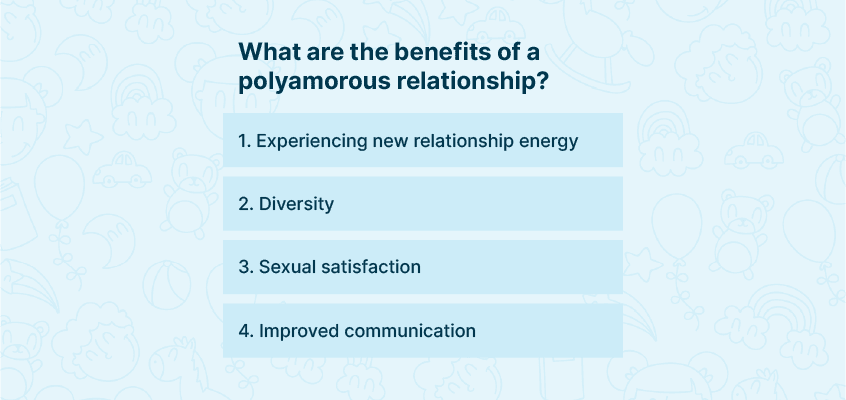Introduction
Have you ever heard of people being in love with more than one person and wondered, “How is that possible”? Well, it indeed is! The non-possessive, honest, responsible and ethical philosophy and practice of loving more than one person simultaneously is called Polyamory, as defined by the Polyamory Society. Let’s get a bit deeper into this philosophy of polyamorous relationships in this article!
Our Wellness Programs
What is a polyamorous relationship?
Societal norms require one individual to fall in love with just one partner. However, many people today love more than one partner. The practice of having more than one romantic relationship is called Polyamory. It gives people the freedom to choose more than one partner to be involved. Contrary to popular belief, Polyamory is increasingly common, and this relationship style works for many. Like monogamous relationships, polyamorous relationships can be fulfilling[1], healthy, and satisfying, depending on the individuals involved.
Looking for services related to this subject? Get in touch with these experts today!!
Experts

Kirti Bajpai

India
Psychologist
Experience: 5 years

Neelam Parwani

India
Life Coach
Experience: 5 years

Mansi Chawla

India
Psychologist
Experience: 12 years

Sapna Zarwal

India
Psychologist
Experience: 19 years
What are the benefits of a polyamorous relationship?
Getting into this type of relationship requires some serious consideration. Here are some benefits of polyamorous relationships[3]:
- Experiencing new relationships energy
Most people in monogamous relationships reminisce about when they fell in love with their partner. A newly formed relationship’s spark and energy tend to fade as the relationship matures. However, since people in polyamorous relationships have multiple partners, they experience this ‘new relationship energy’ more often.
- Diversity
Polyamory does away with boredom which is common in monogamous relationships and marriages. Having diversity makes relationships exciting.
- Sexual satisfaction[2]
Polyamorous relationships allow sexual diversity, the very ‘spice of life.’ With multiple partners, you get a chance to experiment with different lovemaking styles.
- Improved communication
To be in a successful polyamorous relationship, people must have excellent communication skills and express their feelings and emotions while keeping a clean slate with their partners. People improve their communication skills to navigate the choppy waters of this type of relationship.
What are the drawbacks of a polyamorous relationship?
Such relationships have their flaws and challenges. Some that you need to watch out for include:
- Jealousy
It is human nature to experience intense feelings of possessiveness and jealousy. While these feelings remain strong even in monogamous relationships, polyamorous relationships have immense potential to create jealousy in the minds of the people involved. Jealousy can complicate polyamorous relationships.
- Complexity
Despite the excitement and emotional and sexual gratification you may get from a polyamorous relationship, these relationships are far more complicated than monogamous relationships. While ‘the more, the merrier is one side of the coin, it can quickly turn into ‘the more, the messier.
- Health risk
Though safe sex practices may be practised in polyamorous relationships, having multiple partners who have multiple partners increases your risk for sexually transmitted diseases.
- Facing the society
Society has still not accepted the concept of Polyamorous Relationships. Many consider it taboo and arrive from a harsh, negative perspective. Due to a lack of understanding and awareness, people in such relationships tend to face severe criticism, ostracism and judgement from society. It is difficult for people to get an individual who has multiple romantic partners, which can significantly reduce their circle of family and friends.
- Legal issues
Due to the lack of talks, we don’t have solid laws or acts safeguarding people in polyamorous Relationships. When a person’s involved with many simultaneously, the chances of legalities and misuse of laws become relatively high.
Challenges of Being in a Polyamorous Relationship
Monogamous relationships have mainly been predominant in our society in recent times, and so, it is easier to navigate through them. With this type of relationship, however, the challenges are more significant due to their nontraditional nature.
If you are thinking of a polyamorous relationship, here are some challenges you should be aware of:
- Equality
Polyamorous relationships are built on the concept that you can love more than one person, but loving many at the same time is uncharted territory for many. It is natural for humans to favour one person over the other. It is a smooth road as long as this is acceptable to other partners in a such relationship. However, not having clear boundaries and understanding can mess up this type of relationship.
- Overcoming jealousy
A significant challenge is when more than one romantic partner is overcoming jealousy. Just like jealousy can ruin a monogamous relationship, it can have similar effects even on polyamorous relationships as well.
- Polyamorous parenting
When polyamorous individuals are parents, it can be challenging to parent their kids. It is essential to maintain the delicate balance between being a parent and a part of polyamorous relationships.
Polyamory in Your Life
If you are or wish to be in a such relationship, clear communication and setting boundaries from the start are vital. This type of relationship tends to be complex and may leave some individuals vulnerable to exploitation.
Here are a few tips to navigate through such a relationship successfully:
- Ensure that you and your partners are all on the same page about physical and emotional boundaries.
- Support one another just like you would in a monogamous relationship.
- Avoid comparing your relationship with your partner and your partner’s relationships with their metamours (partner’s other partner(s)).
- It is natural to feel jealous or anxious in a polyamorous relationship. Communication and expressing these feelings are essential.
Conclusion
Whether Polyamory is for you or not is a very personal decision that you need to make. While it may sound liberating and exciting, such relationships come with challenges and issues, often more complicated than a monogamous relationship. If you think you want to explore this type of relationship, be honest with your feelings and your partners at all times. Sexuality choices constantly evolve, and realisation can come late for many individuals, which is okay.
Have queries about polyamorous relationships? Seek help from our experts at United We Care today!
| [1] | M. E. Mitchell, K. Bartholomew, and R. J. Cobb, “Need fulfilment in polyamorous relationships,” J. Sex Res., vol. 51, no. 3, pp. 329–339, 2014. |
| [2] | J. L. Matsick, T. D. Conley, A. Ziegler, A. C. Moors, and J. D. Rubin, “Love and sex: polyamorous relationships s,” Psychol. Sex., vol. 5, no. 4, pp. 339–348, 2014. |
| [3] | K. Wosick-Correa, “Agreements, rules and agentic fidelity in polyamorous relationships,” Psychol. Sex., vol. 1, no. 1, pp. 44–61, 2010. |


 Conflict Management in Relationships
Conflict Management in Relationships
 Healing from Heartbreak
Healing from Heartbreak Coping With Anxiety
Coping With Anxiety Get Started With Mindfulness
Get Started With Mindfulness Healing With Meditation
Healing With Meditation








